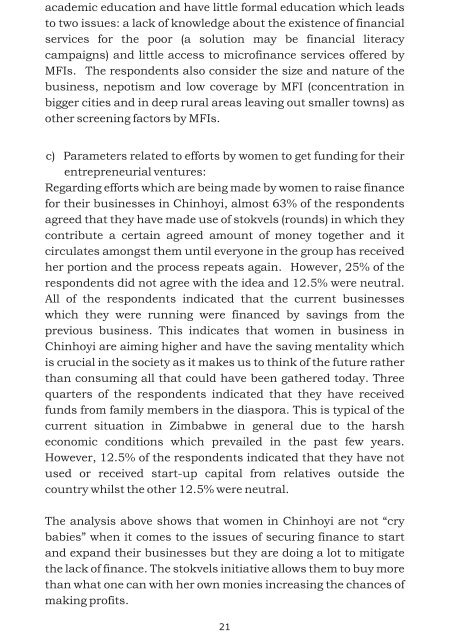Beneficiaries are actors too.pdf - Southern Institute of Peace ...
Beneficiaries are actors too.pdf - Southern Institute of Peace ...
Beneficiaries are actors too.pdf - Southern Institute of Peace ...
You also want an ePaper? Increase the reach of your titles
YUMPU automatically turns print PDFs into web optimized ePapers that Google loves.
academic education and have little formal education which leads<br />
to two issues: a lack <strong>of</strong> knowledge about the existence <strong>of</strong> financial<br />
services for the poor (a solution may be financial literacy<br />
campaigns) and little access to micr<strong>of</strong>inance services <strong>of</strong>fered by<br />
MFIs. The respondents also consider the size and nature <strong>of</strong> the<br />
business, nepotism and low coverage by MFI (concentration in<br />
bigger cities and in deep rural <strong>are</strong>as leaving out smaller towns) as<br />
other screening f<strong>actors</strong> by MFIs.<br />
c) Parameters related to efforts by women to get funding for their<br />
entrepreneurial ventures:<br />
Regarding efforts which <strong>are</strong> being made by women to raise finance<br />
for their businesses in Chinhoyi, almost 63% <strong>of</strong> the respondents<br />
agreed that they have made use <strong>of</strong> stokvels (rounds) in which they<br />
contribute a certain agreed amount <strong>of</strong> money together and it<br />
circulates amongst them until everyone in the group has received<br />
her portion and the process repeats again. However, 25% <strong>of</strong> the<br />
respondents did not agree with the idea and 12.5% were neutral.<br />
All <strong>of</strong> the respondents indicated that the current businesses<br />
which they were running were financed by savings from the<br />
previous business. This indicates that women in business in<br />
Chinhoyi <strong>are</strong> aiming higher and have the saving mentality which<br />
is crucial in the society as it makes us to think <strong>of</strong> the future rather<br />
than consuming all that could have been gathered today. Three<br />
quarters <strong>of</strong> the respondents indicated that they have received<br />
funds from family members in the diaspora. This is typical <strong>of</strong> the<br />
current situation in Zimbabwe in general due to the harsh<br />
economic conditions which prevailed in the past few years.<br />
However, 12.5% <strong>of</strong> the respondents indicated that they have not<br />
used or received start-up capital from relatives outside the<br />
country whilst the other 12.5% were neutral.<br />
The analysis above shows that women in Chinhoyi <strong>are</strong> not “cry<br />
babies” when it comes to the issues <strong>of</strong> securing finance to start<br />
and expand their businesses but they <strong>are</strong> doing a lot to mitigate<br />
the lack <strong>of</strong> finance. The stokvels initiative allows them to buy more<br />
than what one can with her own monies increasing the chances <strong>of</strong><br />
making pr<strong>of</strong>its.<br />
21


